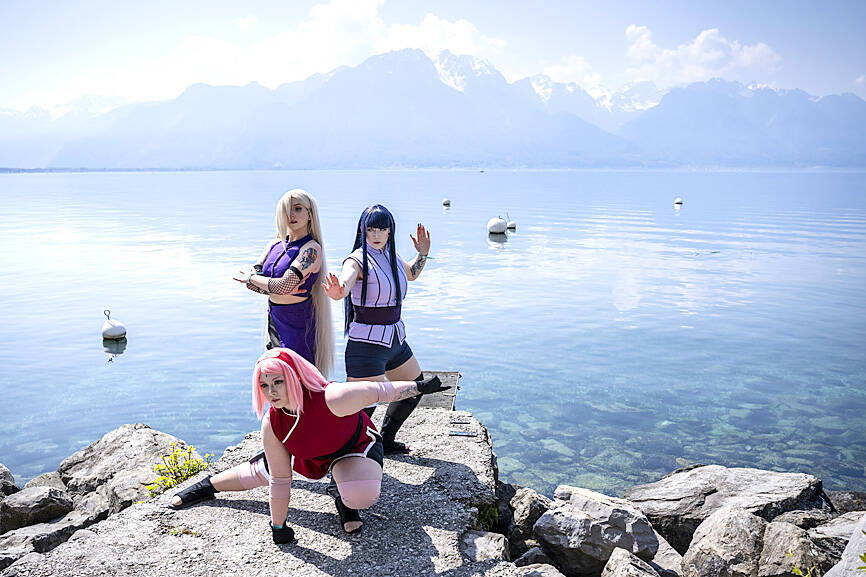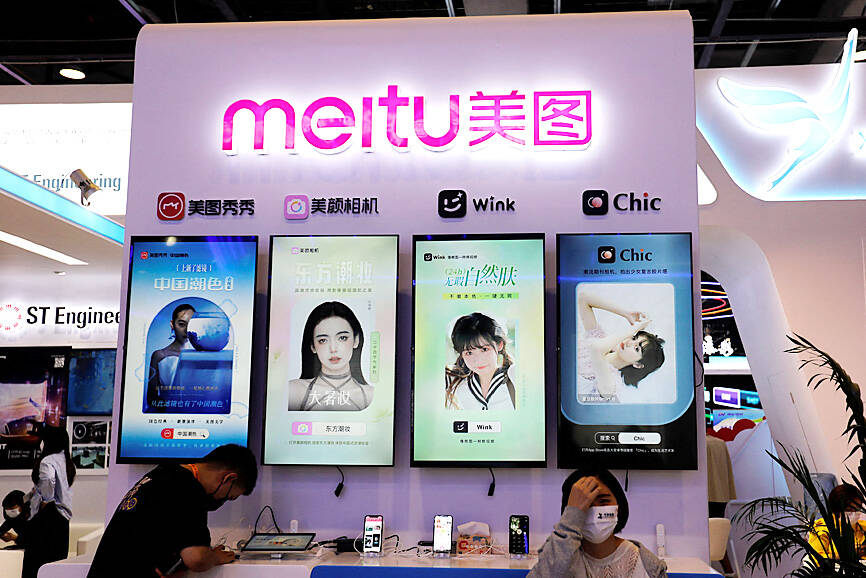The ability to turn a user’s selfie into an anime character has turbocharged an app developed by Meitu Inc (美圖) to the top of Japan’s download rankings over the past week, spurring a big jump in the Hong Kong-based firm’s shares.
Meitu is up more than 50 percent over the past couple of weeks, as its app reached the top of Apple Inc’s free iPhone downloads chart and No. 2 on Android’s Google Play in Japan, data.ai figures showed.
While not new to the Japanese market, the key novelty in the beauty app was the addition of the option to transform a photograph into an anime-style picture with the help of artificial intelligence (AI).

Photo: EPA-EFE
Meitu has been working on AI photo tools since 2017, and its work has begun to pay off with the anime-style selfies, which hit the market in China on Nov. 24 and globally three days later, Meitu CEO Wu Xinhong (吳欣鴻) said.
Since last week, the Meitu app has been among the top three most downloaded on Apple’s App Store in countries including the US, Brazil, Canada, Australia and New Zealand, Wu said.
Global downloads surged 79 percent in the week commencing Nov. 28, data.ai figures showed.

Photo: REUTERS
“We are seeing an explosion of AI-generated content and its huge potential,” Wu said. “It’s an unprecedented opportunity for us, a technological revolution.”
The use of AI to generate images has taken off in popularity this year with the launch of text-to-image systems such as Midjourney and OpenAI’s Dall-E. The technology is not without its controversy, but its appeal and accessibility have helped it proliferate.
Meitu’s approach differs, in applying a style transfer onto an existing image. The company also just introduced the option to add subtle animations — such as falling cherry blossom leaves — to its AI-generated anime avatars.
Japan has proven an eager adopter of this new trend.
University of Tokyo professor Fujio Toriumi said that 40 percent of hashtagged AI-generated images on Twitter since June have come from the country.
Torumi, whose work includes studying information-sharing on Twitter following the 2011 Tohoku earthquake and tsunami, collaborated with the Nikkei Inc to analyze the data.
“Japan has a culture of sharing manga on Twitter,” Toriumi said, adding that the novelty of using AI to generate similar pictures is “both a threat and a surprise” to that established audience, but many are embracing it out of curiosity.
“For most people, it’s a one-shot, but I think some will continue using it in unique ways,” Toriumi said.
At its peak, the AI art fascination was generating close to 80,000 Twitter posts per day out of Japan, although the current flow is about one-third of that, Toriumi said.
Still, he anticipates more new uses in the future, including AI-generated fashion models for clothes companies selling gear online.

Hon Hai Precision Industry Co (鴻海精密) yesterday said that its research institute has launched its first advanced artificial intelligence (AI) large language model (LLM) using traditional Chinese, with technology assistance from Nvidia Corp. Hon Hai, also known as Foxconn Technology Group (富士康科技集團), said the LLM, FoxBrain, is expected to improve its data analysis capabilities for smart manufacturing, and electric vehicle and smart city development. An LLM is a type of AI trained on vast amounts of text data and uses deep learning techniques, particularly neural networks, to process and generate language. They are essential for building and improving AI-powered servers. Nvidia provided assistance

DOMESTIC SUPPLY: The probe comes as Donald Trump has called for the repeal of the US$52.7 billion CHIPS and Science Act, which the US Congress passed in 2022 The Office of the US Trade Representative is to hold a hearing tomorrow into older Chinese-made “legacy” semiconductors that could heap more US tariffs on chips from China that power everyday goods from cars to washing machines to telecoms equipment. The probe, which began during former US president Joe Biden’s tenure in December last year, aims to protect US and other semiconductor producers from China’s massive state-driven buildup of domestic chip supply. A 50 percent US tariff on Chinese semiconductors began on Jan. 1. Legacy chips use older manufacturing processes introduced more than a decade ago and are often far simpler than

STILL HOPEFUL: Delayed payment of NT$5.35 billion from an Indian server client sent its earnings plunging last year, but the firm expects a gradual pickup ahead Asustek Computer Inc (華碩), the world’s No. 5 PC vendor, yesterday reported an 87 percent slump in net profit for last year, dragged by a massive overdue payment from an Indian cloud service provider. The Indian customer has delayed payment totaling NT$5.35 billion (US$162.7 million), Asustek chief financial officer Nick Wu (吳長榮) told an online earnings conference. Asustek shipped servers to India between April and June last year. The customer told Asustek that it is launching multiple fundraising projects and expected to repay the debt in the short term, Wu said. The Indian customer accounted for less than 10 percent to Asustek’s

Gasoline and diesel prices this week are to decrease NT$0.5 and NT$1 per liter respectively as international crude prices continued to fall last week, CPC Corp, Taiwan (CPC, 台灣中油) and Formosa Petrochemical Corp (台塑石化) said yesterday. Effective today, gasoline prices at CPC and Formosa stations are to decrease to NT$29.2, NT$30.7 and NT$32.7 per liter for 92, 95 and 98-octane unleaded gasoline respectively, while premium diesel is to cost NT$27.9 per liter at CPC stations and NT$27.7 at Formosa pumps, the companies said in separate statements. Global crude oil prices dropped last week after the eight OPEC+ members said they would